По всем вопросам обращайтесь на: info@litportal.ru
(©) 2003-2024.
✖
Blackwood's Edinburgh Magazine, Vol. 66, No 409, November 1849
Автор
Год написания книги
2017
Настройки чтения
Размер шрифта
Высота строк
Поля
Lady Macbeth herself corroborates your judgment and Shakspeare's on her husband's character.
TALBOYS.
Does she?
SEWARD.
She does. In that dreadful parley between them on the night of the Murder – she reminds him of a time when
"Nor time nor place
Did then adhere, and yet you would make both;
They have made themselves, and that their fitness now
Does unmake you."
This – mark you, sir – must have been before the Play began!
NORTH.
I have often thought of the words – and Shakspeare himself has so adjusted the action of the Play as that, since the encounter with the Weirds, no opportunity had occurred to Macbeth for the "making of time and place." Therefore it must, as you say, have been before it. Buller, what say you now?
BULLER.
Gagged.
NORTH.
True, she speaks of his being "full of the milk of human kindness." The words have become favourites with us, who are an affectionate and domestic people – and are lovingly applied to the loving; but Lady Macbeth attached no such profound sense to them as we do; and meant merely that she thought her husband would, after all, much prefer greatness unbought by blood; and, at the time she referred to, it is probable he would; but that she meant no more than that, is plain from the continuation of her praise, in which her ideas get not a little confused; and her words, interpret them as you will, leave nothing "milky" in Macbeth at all. Milk of human kindness, indeed!
TALBOYS.
"What thou would'st highly,
That would'st thou holily; would'st not play false,
And yet would'st wrongly win: thou'dst have great Glamis,
That which cries, 'Thus thou must do, if thou have it;
And that which rather thou dost fear to do
Than wishest should be undone.'"
That is her Ladyship's notion of the "milk of human kindness"! "I wish somebody would murder Duncan – as for murdering him myself, I am much too tender-hearted and humane for perpetrating such cruelty with my own hand!"
BULLER.
Won't you believe a Wife to be a good judge of her Husband's disposition?
NORTH.
Not Lady Macbeth. For does not she herself tell us, at the same time, that he had formerly schemed how to commit Murder?
BULLER.
Gagged again.
NORTH.
I see no reason for doubting that she was attached to her husband; and Shakspeare loved to put into the lips of women beautiful expressions of love – but he did not intend that we should be deceived thereby in our moral judgements.
SEWARD.
Did this ever occur to you, sir? Macbeth, when hiring the murderers who are to look after Banquo and Fleance, cites a conversation in which he had demonstrated to them that the oppression under which they had long suffered, and which they had supposed to proceed from Macbeth, proceeded really from Banquo? My firm belief is that it proceeded from Macbeth – that their suspicion was right – that Macbeth is misleading them – and that Shakspeare means you to apprehend this. But why should Macbeth have oppressed his inferiors, unless he had been – long since – of a tyrannical nature? He oppresses his inferiors – they are sickened and angered with the world – by his oppression – he tells them 'twas not he but another who had oppressed them – and that other – at his instigation – they willingly murder. An ugly affair altogether.
NORTH.
Very. But let us keep to the First Act – and see what a hypocrite Macbeth has so very soon become – what a savage assassin! He has just followed up his Soliloquy with these significant lines —
"Come what come may,
Time and the hour run through the roughest day;"
when he recollects that Banquo, Rosse, and Angus are standing near. Richard himself is not more wily – guily – smily – and oily; to the Lords his condescension is already quite kingly —
"Kind gentlemen, your pains
Are registered where every day I turn
The leaf to read them" —
TALBOYS.
And soon after, to the King how obsequious!
"The service and the loyalty I owe,
In doing it, pays itself. Your Highness' part
Is to receive our duties; and our duties
Are to your throne and state, children, and servants;
Which do but what they should by doing everything
Safe toward you love and honour."
What would Payne Knight have said to all that? This to his King, whom he has resolved, first good opportunity, to murder!
NORTH.
Duncan is now too happy for this wicked world.
"My plenteous joys,
Wanton in fulness, seek to hide themselves
In drops of sorrow."
Invaders – traitors – now there are none. Peace is restored to the Land – the Throne rock-fast – the line secure —
"We will establish our estate upon
Our eldest, Malcolm; whom we name hereafter,
The Prince of Cumberland: which honour must











